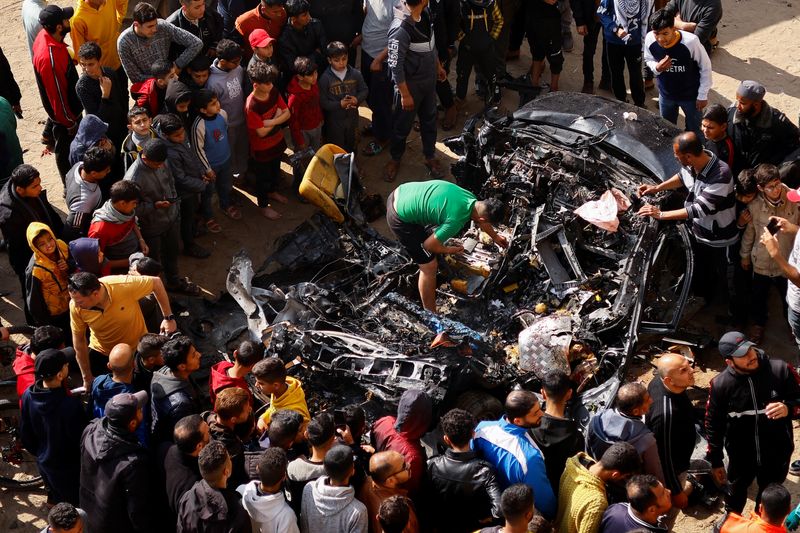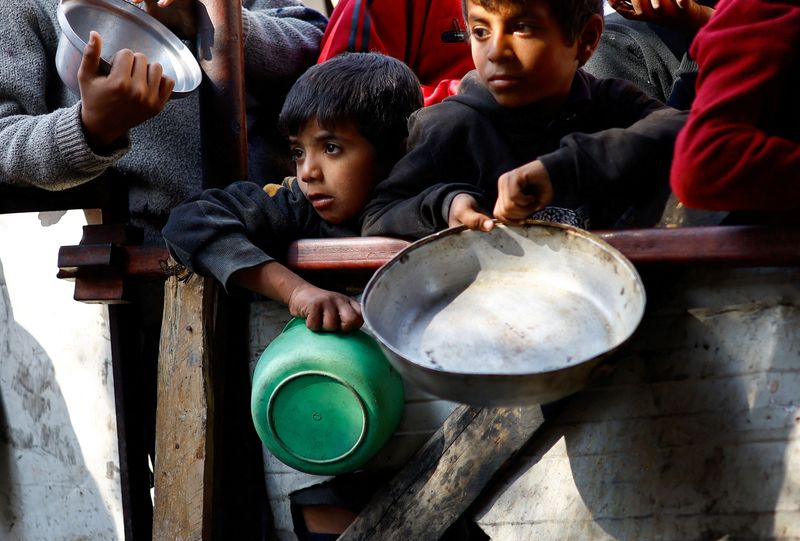By Nidal al-Mughrabi and Henriette Chacar
DOHA/JERUSALEM (Reuters) -Israeli air strikes killed 17 people in Rafah on the Gaza border overnight, medics said on Saturday, as over a million Palestinians crammed into the city awaited a full-scale offensive with the rest of the enclave in ruins and nowhere left to run.
Four months into the war, Israeli Prime Minister Benjamin Netanyahu's office said it had ordered the military to develop a plan to evacuate Rafah and destroy four Hamas battalions it says are deployed there.
The Israeli military said the air force killed two Hamas operatives in Rafah on Saturday.
Israel's military ordered civilians to flee south before previous assaults on Gaza's cities, but now there is no obvious place to go and aid agencies have said many people could die.
"Any Israeli incursion in Rafah means massacres, means destruction. People are filling every inch of the city and we have nowhere to go," said Rezik Salah, 35, who fled from Gaza City for Rafah with his wife and two children early in the war.
A possible assault on Rafah prompted international concern, including posts on social media from British Foreign Secretary David Cameron and Dutch Foreign Minister Hanke Bruins Slot.
"Deeply concerned about the prospect of a military offensive in Rafah – over half of Gaza’s population are sheltering in the area. The priority must be an immediate pause in the fighting to get aid in and hostages out, then progress towards a sustainable, permanent ceasefire," Cameron said on X, formerly known as Twitter.
"Hard to see how large-scale military operations in such a densely populated area would not lead to many civilian casualties and a bigger humanitarian catastrophe. This is unjustifiable," Bruins Slot said.
AIRSTRIKES
The conflict in Gaza began on Oct. 7 when Hamas gunmen stormed border defences to attack Israeli towns, killing around 1,200 people, mostly civilians, and taking around 250 hostages back to Gaza, according to Israeli tallies.
Israel responded with a massive bombardment and ground offensive in which about 28,000 Palestinians, mostly civilians, have been killed, according to medical authorities in Hamas-run Gaza.
The conflict has threatened to spread across the Middle East, with Israel and Lebanon's Hezbollah regularly trading fire, and flare-ups in Syria, Iraq and Yemen.
In Yemen, the Iranian-backed Houthi militia held a funeral on Saturday for at least 17 militants killed during joint U.S.-British airstrikes, the Houthi-run Saba news agency said.
The Houthis have used drones to attack merchant ships since Nov. 19 in what they say is a response to Israel's military operations in Gaza, prompting retaliatory strikes from Britain and the United States.
The U.S. Central Command said its forces conducted self-defence strikes against Houthi missiles and drones on Saturday.
In Lebanon, an Israeli strike targeted a Palestinian figure close to Hamas, security sources said. The target survived but three others were killed, including a member of Hezbollah.
Much of Gaza has been reduced to rubble by Israeli airstrikes, artillery fire and controlled detonations. More than 85% of Gaza's 2.3 million inhabitants have been left homeless.
Most of the displaced have sought shelter in Rafah, on the border with Egypt, but after fruitless ceasefire talks, Netanyahu this week said Israeli forces would fight on until "total victory."
On Friday night an airstrike on a Rafah house killed 11 people and wounded dozens and a second strike killed six people in another house, medical officials said. Earlier on Saturday two separate Israeli airstrikes killed five members of the Hamas-run police force in Rafah, including a senior officer, Hamas and medics said.
In the other main southern Gaza city of Khan Younis, where many displaced people initially fled before an Israeli offensive last month, the Palestinian Health Ministry voiced alarm at Israeli operations around the main Nasser Hospital.
The ministry said Israeli forces had surrounded the hospital and were shooting in the vicinity, raising concerns about 300 medical staff, 450 patients and 10,000 people sheltering there.
Footage circulating on social media, which Reuters could not independently verify, showed tanks at the hospital gates.
Israel's military said its forces were continuing intensive activities in Khan Younis as well as northern and central Gaza, killing militants, seizing weapons and striking infrastructure.
It did not immediately respond to a request for comment on the situation at Nasser hospital.
FIERCE FIGHTING
In Gaza City, the first major population center targeted after Israeli ground forces invaded in October, residents reported fierce fighting on Saturday.
Israel said its forces had discovered a tunnel network hundreds of metres (yards) long running partly under the Gaza City headquarters of UNRWA, the main relief agency for Palestinians.
The military said it was evidence of how Hamas had exploited UNRWA, which has launched an internal probe and seen some donor countries freeze funding over Israel's allegations that 12 of its roughly 13,000 employees in the Gaza Strip had participated in the Oct. 7 attacks.
UNRWA said its staff left its headquarters in Gaza City on Oct. 12 following Israeli evacuation orders.
"We have not used that compound since we left it nor are we aware of any activity that may have taken place there," It said.
An Israeli official who declined to be named said Israel would try to organise for people in Rafah to be moved back north ahead of any assault.
Egypt has said it will not allow any mass displacement of Palestinians into its territory. Palestinians fear Israel means to drive them from their homeland, then forbid their return.

The continued warfare in Gaza City, long after Israel said it was redeploying some troops to other areas, shows the limitations of any evacuation proposal.
Palestinian rescue workers in Gaza City said they had found the bodies of a six-year-old girl and her family members, along with the ambulance team sent to rescue them, days after an audio clip of her call to dispatchers begging for help was released.
